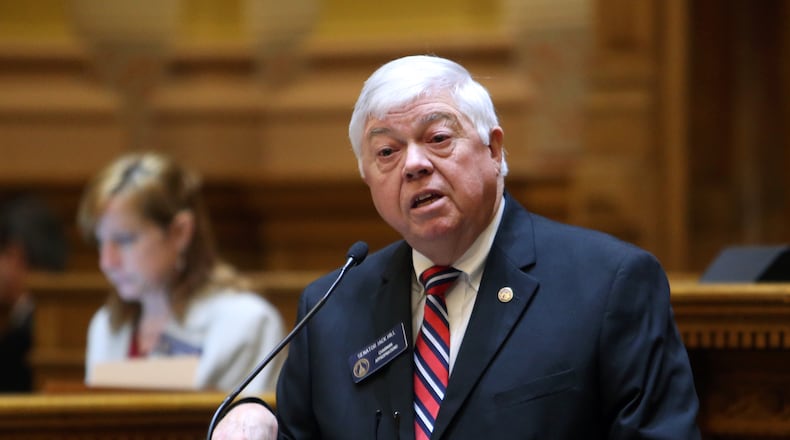Georgia Senate leaders followed their House colleagues Monday in backing a midyear budget that restores funding for everything from public health grants, mental health services and efforts to train doctors to local library materials.
In general, the Senate, like the House, pushed back on many of the proposed cuts that would impact small-town Georgia, a key constituency in a chamber largely run by lawmakers from outside metro Atlanta.
"What we tried to do is look at service reductions, and where we could, we restored services that directly affected children, the elderly, the disabled and essential public safety needs," said Senate Appropriations Chairman Jack Hill, R-Reidsville.
Like the House, the Senate Appropriations Committee voted to make major changes to Kemp’s proposal to cut millions from this year’s budget, and the full chamber will vote on it Wednesday. Then, the Senate and House will negotiate a final spending plan for the rest of fiscal 2020, which ends June 30.
Next up for both will be Kemp’s $28.1 billion budget for fiscal 2021, which begins July 1. That proposal includes $300 million in spending cuts — but also pay raises for teachers and state employees earning less than $40,000 a year — and could produce a more contentious fight over state spending.
Kemp ordered state agencies in August to prepare plans for 4% budget cuts this fiscal year and 6% next year to both respond to slow tax collections last year and provide enough money for the governor's priorities, including a $2,000 teacher pay raise and his effort to attack gangs.
About three-fourths of the budget — money that goes to k-12 schools, colleges, the health program Medicaid and transportation — was exempted from reductions.
Through the state’s budget, taxpayers help educate 2 million children, provide health care to more than 2 million Georgians, build roads and bridges, manage parks, investigate crimes and incarcerate criminals, and regulate insurance firms and utilities, along with dozens of professions. The state issues driver’s licenses and helps pay for nursing home care for the elderly.
Under state law, the governor sets the estimate of how much tax money the government is expected to bring in next year. Lawmakers can’t spend more than that, so to make up for things they want to add, they must cut elsewhere.
The House and Senate agreed to mitigate some of the cuts.
Hill said the midyear budget would cut $159 million in spending and leave 1,255 vacant positions unfilled.
Kemp's proposal to eliminate vacant state positions has been controversial, with lawmakers saying some of them — including crime lab scientists and guards in the juvenile justice system — need to be filled.
Both chambers voted to restore funding for some of the positions, including public defenders, lab workers and Department of Agriculture food safety inspectors.
Both chambers rejected Kemp’s proposal to cut funding to accountability courts. The courts, which were greatly expanded by his predecessor, allow defendants to avoid prison time if they stay sober, get treatment, receive an education and find a job. The courts are set up for drug addicts, drunken drivers, the mentally ill and veterans who’ve been charged largely with nonviolent crimes and low-level offenses, and they have been highly popular with lawmakers.
Both chambers said no to Kemp’s cuts in funding for preparing doctors at the Morehouse School of Medicine and Mercer University’s medical school, and to his proposed reduction to the Rural Health Systems Innovation Center at Mercer, a project lawmakers started a few years ago to help improve health care in rural Georgia.
They also reduced cuts that Kemp proposed for mental health programs and eliminated reductions for local library materials. Senate budget writers pushed back on Kemp’s proposal to cut $6.3 million in grants to county public health departments.
Like the House, after months of hand-wringing over the impact of Kemp’s proposed spending cuts, Senate budget writers supported spending $250,000 to refit cars on a short-line tourist excursion train in southwest Georgia.
About the Author
Keep Reading
The Latest
Featured




